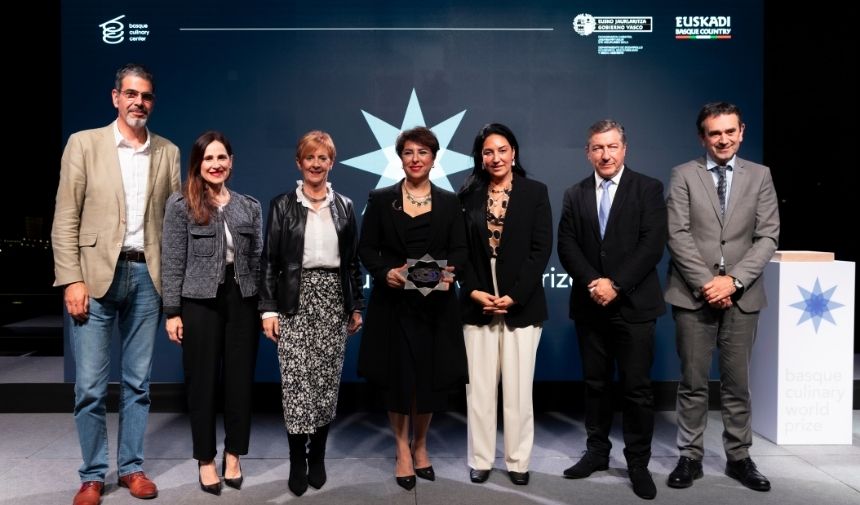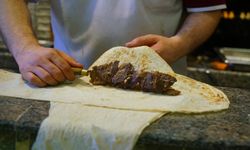Ebru Baybara Demir, the chef from Türkiye, has been awarded the Basque Culinary World Prize 2023, often referred to as the "Nobel Prize of Gastronomy." The award ceremony took place at Prisma de Tabakalera in Donostia-San Sebastián. Ebru Baybara Demir, with over twenty years of experience, has played a leading role in various initiatives addressing priority issues such as migration processes in the region, cultivation of local products in the face of climate change, and cultural integration in Mardin, near the Syrian border. Following destructive events like the earthquake in Türkiye in February 2023, she also led humanitarian aid efforts.
Focuses on chefs leading
The Basque Culinary World Prize is a global award presented by the Basque Government as part of the comprehensive strategy of the Basque Culinary Center, a leading academic institution in the gastronomy field in the Basque Country (Euskadi). Unlike similar awards, this prize focuses on chefs leading transformative initiatives in areas such as innovation, technology, education, environment, health, food industry, social, and economic development, rewarding their achievements.
Arantxa Tapia, the Minister of Economic Development, Sustainability, and Environment of the Basque Government, presented Ebru Baybara Demir with the award and an additional prize of 100,000 euros for use in her new projects benefiting the community. Before the award ceremony, speeches were given by Joan Roca, the president of the Basque Culinary World Prize Jury, and Vicente Atxa, the Chairman of the Board of Trustees of the Basque Culinary Center.
Helped refugees
Chef Ebru Baybara Demir has implemented multicultural integration and employment-focused unifying projects, especially for refugees under temporary protection and those living far from their home countries. In a region where different cultures coexist, she has undertaken projects to support understanding and coexistence. Additionally, she initiated the "Gönül Mutfağı" (Kitchen of the Heart) project after the earthquake affecting Syria and Türkiye in February, providing hot meals to thousands of people affected by the disaster.
In addition to her ongoing efforts, Chef Ebru Baybara Demir has collaborated with international organizations, local governments, public institutions, private organizations, and local cooperatives for over twenty years, creating positive impact in the community. In Mardin, a region that has transformed from a place with only one restaurant to a tourist center, she placed cooking at the forefront of tourism and development. She encouraged local women to open their kitchens in historic homes, creating employment opportunities and enhancing the city's tourist experience.
Developed local seeds
Furthermore, she played a significant role in culinary training programs supported by organizations like UNHCR and FAO, focusing on creating employment opportunities for refugees. She continues to support the From Soil to Plate Agricultural Development Cooperative in Mardin, where local volunteers work to improve the production and consumption of local seeds like Sorgül. This initiative, which started with Sorgül, has evolved into a structure where soap, jam, pulses, and local flavors are sold. Ebru Baybara Demir also continues the biodegradable waste management project that began in Diyarbakır markets, aiming to use waste fruits and vegetables for compost production.

It is important for Turkish women
The 100,000-euro monetary award from the Basque Culinary World Prize will support Chef Ebru Baybara Demir's initiatives that benefit people, the environment, and society. In her statement about the award, she expressed, "Winning the 2023 Basque Culinary World Prize, often referred to as the Nobel of Gastronomy, is an indescribable honor. Being defined as the 'chef power of nature' by leading experts in the field of gastronomy is incredibly meaningful to me. Being deemed worthy of this significant award is not only a recognition of me as a chef but also holds great importance for me and my country as a Turkish woman advancing on the path opened by Atatürk in the centenary of our Republic. For me, the kitchen represents understanding the significance of everyone involved in the journey of a meal from soil to plate beyond physical barriers. After my encounter with the Basque Culinary World Prize in 2017, I fully embraced this definition. I dedicate the award to the women who have accompanied me on this journey, changing their lives, to the future gastronomes of Türkiye, inspired by the fact that geography is the most beautiful fate, and to all my fellow travelers who share the same philosophy with me."
Who is on the jury?
Ebru Baybara Demir was selected by a special jury consisting of some of the world's most influential chefs and representatives of the Basque Culinary Center International Committee. Other renowned chefs on the jury included Yoshihiro Narisawa (Japan), Michel Bras (France), Gastón Acurio (Peru), Manu Buffara (Brazil), Dominique Crenn (USA), Trine Hahnemann (Denmark), Elena Reygadas (Mexico), Pia León (Peru), Josh Niland (Australia), Narda Lepes (Argentina), and ThiTid Tassanakajohn (Ton) (Thailand).
The Basque Culinary World Prize, initiated in 2016, aims to showcase the transformative power of gastronomy by highlighting the efforts of entrepreneurial individuals, innovative and creative people committed to society. Supported by international experts, including academics and top chefs, the prize, often dubbed the "Nobel Prize of Gastronomy" by the press, received over 1,200 nominations from 42 countries, evaluating around 800 candidates.
Industry professionals and organizations nominated chefs who demonstrated the potential for gastronomy to be a tool for change in areas such as social integration, sustainability, and education from around the world for over a month. The Basque Culinary Center formed a comprehensive team to research and verify these profiles.
On June 7, the Basque Culinary World Prize announced Ebru Baybara Demir as the winner of 2023. Two special mentions were also given to chefs who demonstrated excellence, innovation, creativity, and determination in their inspiring projects. Nicole Pisani (UK), with her project aiming to revolutionize school food services by focusing on nourishing both the body and mind of children, and Heidi Bjerkan (Norway), who earned recognition for her visionary initiative that combines small producers, social entrepreneurs, and educators through a multi-restaurant model focused on circular economy principles.
Through the annual announcement of the winner and special mentions, the Basque Culinary World Prize provides an opportunity to send a message to the world about the value a chef can bring to society. This year, in addition to social integration related to migration and diversifying talents, attention is also drawn to the theme of food education.






